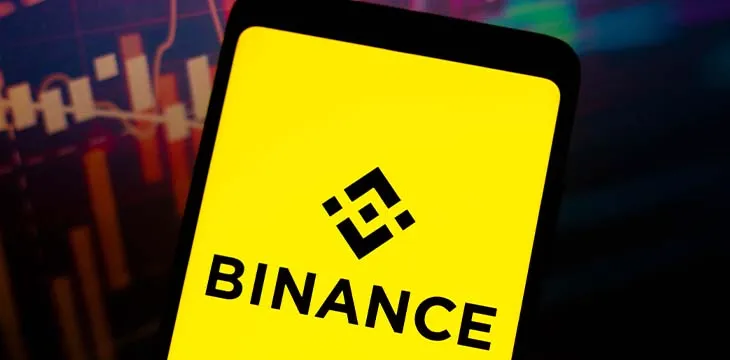|
Getting your Trinity Audio player ready...
|
The Binance exchange has had its financial wings clipped by its U.S. banking partner, while rival exchanges wonder whether Binance cares about insider trading.
Over the weekend, Binance issued an email to customers explaining that “the banking partner that services your account has advised that they are no longer able to process SWIFT fiat (USD) transactions for individuals of less than 100,000 USD as of February 1st, 2023.” The email claims that Binance is “actively seeking a new SWIFT (USD) partner to avoid any interruption of service.”
The banking partner referenced in the email is Signature Bank, whose dealings with a Binance-affiliated Seychelles-based shell company called Key Vision Development Limited were exposed last week. Key Vision was struck off the Seychelles register in September 2021, a fact that doesn’t seem to have negatively impacted its Signature relationship (at least, until now).
Binance issued a statement Sunday that the SWIFT crackdown applied to “all Signature’s crypto exchange clients,” but Binance is so far the only exchange to have publicly acknowledged Signature’s new stance. Signature’s exchange clients include Kraken, Huobi, OKX, Bitstamp, Bithumb, and eToro, none of which appear to have issued similar caveats to their users.
The $100,000 transaction minimum that Binance claims Signature has imposed is curious, to say the least, given that transactions of that scale would be far more likely to involve shady operators and, thus, should be less attractive for Signature to handle. Then there’s the striking similarity with the $100,000 minimum the operators of the controversial Tether (USDT) stablecoin require to process any fiat redemption requests.
This latter similarity has led some to speculate that Binance is now relying on the Deltec Bank & Trust in the Bahamas, which handles banking on behalf of iFinex, the parent company of both Tether and the equally dodgy Bitfinex exchange. Deltec also handled much of FTX/Alameda’s banking needs before their inglorious implosion. Deltec’s U.S. correspondent bank is Citibank, which surely must be getting tired of these associations by now.
Signature has yet to publicly comment on Binance’s announcement, which was originally reported by Bloomberg. Similarly, Binance’s normally chatty CEO Changpeng ‘CZ’ Zhao has yet to attempt to put a positive spin on the Signature setback. CZ may still be rattled from Binance being publicly shamed as the top receiving counterparty of the Bitzlato exchange, which was shut down by U.S. authorities last week for its ties to the former top ‘darknet’ marketplace Hydra.
On Monday, the crimefighters at Europol announced that five individuals connected to Bitzlato had been arrested so far, and other individuals remain under investigation. Europol stated that nearly half of the €2.1 billion ($2.3 billion) worth of crypto assets handled by Bitzlato “had links to criminal activities,” including “cyber scams, money laundering, ransomware and child abuse material.”
If it’s on our site, it’s our money
Things could go from bad to worse for Binance on the financial front. Late Monday, some Binance customers began reporting issues with withdrawing their U.K. pounds from the exchange. Alarmingly, the ‘withdraw’ and ‘deposit’ GBP options appear to have been removed from the Binance site, leaving only the ‘buy,’ ‘trade,’ and ‘convert’ options. The Binance app is currently allowing only GBP deposits.
Binance has long had difficulty finding its footing in the U.K., in part because the company employs what Patrick McKenzie famously describes as “a Bond villain compliance strategy and are open and notorious for it.” The U.K.’s Financial Conduct Authority has repeatedly called out Binance for its efforts to gain ‘back door’ entry into the market, but bankers may finally be taking more concrete actions to bring CZ to heel.
Earlier this month, Forbes reported that Binance had experienced record outflows, with estimates of between 25-30% of all assets being withdrawn from the exchange since November. With more bankers apparently deciding they want nothing to do with Binance and/or crypto in general, expect customers to keep withdrawing…if they can.
Binance insider trading irks Coinbase director
Meanwhile, Conor Grogan, a director of the U.S.-based Coinbase exchange (NASDAQ: COIN), appears irked that his company is under fire for failing to prevent insider trading on new token listings while Binance seems to be getting off scot-free. In a Twitter thread posted Sunday, Grogan claims to have identified “a pattern of Binance front-running over 18+ months.”
Rogan proceeded to detail a pattern of transactions involving massive purchases of tokens immediately prior to their initial listing on Binance, immediately followed by the dumping of the purchased tokens moments after their listing, making five- and six-figure profits in the process.
Rogan stressed that he was “not claiming any connection to Binance other than these trades being timed before and after the listing announcement.” But he posited one theory of “a rogue employee connected to the listings team who would have details on new asset announcements.”
Rogan notes that some of the transactions dated back to 2021 and were covered at the time by the likes of the Wall Street Journal. But his larger point is that the wallets appear to be still active, and similar transactions may be ongoing, despite Binance’s seeming ability to identify the trader(s) in question and launch some investigation.
Of course, Binance is unlikely to conduct any such investigation because CZ doesn’t care. But with U.S. authorities continuing to draw their circle tighter around CZ, his Bond villain status may soon be downgraded from Blofeld to Dr. Evil.
Rogan is likely sensitive to this type of activity going unpunished due to Coinbase having been targeted by the U.S. Securities and Exchange Commission (SEC) last year for allowing a Coinbase staffer and two accomplices to conduct similar trades based on advance knowledge of when certain tokens would debut on Coinbase.
Nikhil Wahi, the brother of the former Coinbase product manager at the center of the controversy, was sentenced to 10 months in prison earlier this month after pleading guilty to wire fraud conspiracy last September.
It’s A Wonderful Life (if you’re a banker)
Returning to Signature booting Binance for a moment, that decision came just weeks after a swathe of U.S. financial regulators issued a joint statement to banks regarding the “key risks” associated with digital asset customers. The statement cited a broad spectrum of crypto-affiliated activities that are “highly likely to be inconsistent with safe and sound banking practices.”
Following November’s bankruptcy of the FTX exchange—a former Signature customer—Signature CEO Joe DePaolo claimed that his company was “not just a crypto bank, and we want that to come across loud and clear.” Signature took steps to limit crypto’s share of the bank’s overall deposits, resulting in a $7.35 billion “planned reduction” in crypto deposits from Q3 to Q4 2022.
Earlier this month, the New York-based Metropolitan Commercial Bank (MCB) announced its intention to “fully exit the crypto-asset related vertical.” The announcement cited “recent developments in the crypto-asset industry, material changes in the regulatory environment regarding banks’ involvement in crypto-asset related businesses, and a strategic assessment of the business case for MCB’s further involvement at this time.”
Silvergate Capital Corporation, which lost $1 billion in Q4 largely due to the FTX implosion, recently came under fire for accepting a $4.3 billion lifeline from the Federal Home Loan Bank (FHLB) system. That sum represents nearly all of Silvergate’s current $4.6 billion cash on hand. Signature also received billions in FHLB loans during Q4, although Signature’s crypto reliance was a smaller slice of its overall business than Silvergate’s.
The FHLB system was set up during the Great Depression to ensure adequate liquidity for mortgage-lending and ‘community investment.’ News that crypto-friendly banks sought and received billions from the FHLB during 2022’s great crypto crash has sparked criticism that the FHLB is diverging too far from its original mandate.
It’s also boosted concerns that the U.S. banking system isn’t as insulated from crypto meltdowns as was widely believed. While the FHLB loans come from 11 independent banks and no taxpayer funds are directly involved, the taxpayer-funded Federal Deposit Insurance Corporation (FDIC) could be called upon to bail out these institutions should the recipients of these loans be unable to honor their debts.
Follow CoinGeek’s Crypto Crime Cartel series, which delves into the stream of groups—from BitMEX to Binance, Bitcoin.com, Blockstream, ShapeShift, Coinbase, Ripple,
Ethereum, FTX and Tether—who have co-opted the digital asset revolution and turned the industry into a minefield for naïve (and even experienced) players in the market.

 04-26-2025
04-26-2025 





